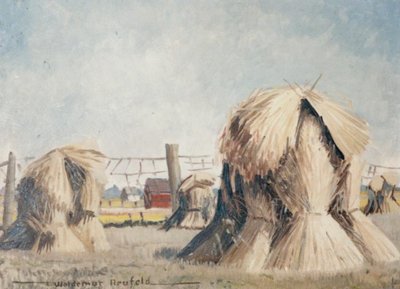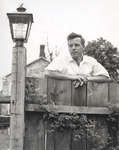Sandusky Wheat Schooks
Description
- Creator
- Neufeld, Woldemar, Artist
- Media Type
- Object
- Item Type
- Paintings
- Description
- Framed
Water Soluble Paint
Artist description: How many wheat schooks have I painted would be a hard question to answer, but if I said many, I would be right. It could be that I spent several summers schooking in the Ukraine, the Crimea and in Waterloo.
- Notes
- The Wilfrid Laurier University Permanent Art Collection cares for approximately 400 pieces by Woldemar Neufeld.
Woldemar Neufeld (1909 - 2002)
Born of German-speaking Mennonites in Waldheim, Russia, Woldemar Neufeld immigrated to Canada in 1924, arriving with hope that the "new world" would welcome him with opportunity. At age 15 Neufeld settled in Waterloo, Ontario. Eager to erase his immigrant identity, Neufeld plunged into the Canadian way of life by rapidly learning the Pennsylvania-German dialect that was spoken by many inhabitants locally, and by learning English at school.
Neufeld's parents were insistent that their son receive serious training in religion and German, as he would have received at a Mennonite school in Russia. Enrollment at Waterloo College (now Wilfrid Laurier University) meant a strict education given by Lutheran Seminarians - Neufeld relished the degree of seriousness with which art was taught. A visit to Homer Watson's studio in the village of Doon, a few miles from Waterloo, proved to have a significant influence on Neufeld's future career. Watson, then a well-known Canadian painter, insisted that, should he ever pursue formal studies, Neufeld should remain true to his own vision and style.
Upon graduation from the college school in 1930, Neufeld enjoyed a career as an independent artist, living and working in Waterloo, Toronto and Vancouver. He helped found the Art Society of Kitchener, an artist collective that still exists today. He began taking ambitious sketching trips to northern Ontario, and short visits to see his sister in the United States. During one of these visits, Neufeld decided to enroll at the Art Institute in Cleveland, Ohio, and so came to spend the rest of his career in the U.S.A.
After spending a decade chronicling the area surrounding Cleveland in his paintings, Neufeld moved to New York City in 1945. Settling into a studio on the Upper East Side, Neufeld established himself as an artist and instructor along the city's East River. The bridges, boats and shorelines became prominent as his subjects for oils, watercolours and block prints. He devoted himself to documenting the area, working with children in settlement houses and serving as an art director.
In 1949, the artist moved to an eight-acre farm among the hills, lakes and forests of Connecticut, just 80 miles north of New York City. Here, at New Milford - with Homer Watson's ambitious studio as his inspiration - Neufeld turned his 140-year-old stone house and barn into a home, gallery and summer art school.
New Milford proved to be a further inspiration for the maturing artist. He discovered a passion for the surrounding landscape and subject matter and he chronicled the area in numerous paintings. Delighted with the similarities between this newest home and Waterloo, his first home in North America, Woldemar Neufeld chose to settle in New Milford, the last stop on his artistic journey.
Woldemar Neufeld died on November 24 from complications of Parkinson's disease, shortly after his 93rd birthday. - Date of Original
- 1938
- Image Dimensions
-
Image Width: 13.5in
Image Height: 10.4in
- Local identifier
- 0001-01773
- Collection
- Woldemar Neufeld collection
- Contact
- Wilfrid Laurier University Permanent Art CollectionEmail:infouser@wlu.ca
Website:
Agency street/mail address:75 University Avenue West,
Waterloo, ON
Canada
N2L 3C5



